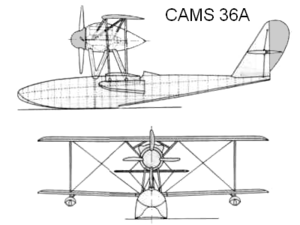Engineering:CAMS 36
| CAMS 36 | |
|---|---|

| |
| Role | Racing flying boat |
| National origin | France |
| Manufacturer | CAMS |
| First flight | 1922 |
| Number built | 2 |
| Variants | CAMS 38 |
The CAMS 36 was a 1920s France flying boat designed and built by Chantiers Aéro-Maritimes de la Seine. It was originally conceived as a single-seat fighter but evolved as a racer to compete in the 1922 Schneider Trophy race. Lack of funds in 1922 and an accident in 1923 meant the two aircraft built failed to participate in a Schneider race.
Design and development
Originally designed as a single-seat biplane flying-boat fighter, the CAMS 36 was modified to compete in the 1922 Schneider Trophy.[1] Originally built with a pusher-propeller this was changed to a tractor arrangement for the 300 hp (224 kW) Hispano-Suiza 8Fd piston engine.[1] Twin vertical wing bracing struts were changed to a single I-type strut.[1] Although the racer proved to be fast in the air, lack of funds prevented the two aircraft from competing.[1]
For the 1923 race one of the aircraft was modified with a larger 360 hp (268 kW) Hispano-Suiza 8Fd piston engine.[1] The I-type struts were changed back to a more conventional arrangement.[1] The new variant was designated the CAM 36bis. On the day of the contest, the 36bis, piloted by Lieutenant Pelletier d'Oisy, collided with a yacht at anchor on the Solent and the damaged aircraft was prevented from racing.[1]
Variants
- CAMS 36
- Prototype flying-boat fighter
- CAMS 36
- Modified for racing and powered by a 300 hp (224 kW) Hispano-Suiza 8Fd engine.
- CAMS 36bis
- Further modifications for the 1923 race, powered by a 360 hp (268 kW) Hispano-Suiza 8Fd engine.
Specifications (CAMS 36 racer)
Data from The Illustrated Encyclopedia of Aircraft[1]
General characteristics
- Crew: one
- Length: 7.75 m (25 ft 5 in)
- Wingspan: 8.60 m (28 ft 3 in)
- Height: 2.80 m (9 ft 2 in)
- Wing area: 20.00 m2 (215.3 sq ft)
- Empty weight: 945 kg (2,083 lb)
- Max takeoff weight: 1,260 kg (2,778 lb)
- Powerplant: 1 × Hispano-Suiza 8Fd inline piston, 220 kW (300 hp)
Performance
- Maximum speed: 250 km/h (160 mph, 130 kn)
References
Notes
Bibliography
- The Illustrated Encyclopedia of Aircraft (Part Work 1982-1985). Orbis Publishing.
External links
 |

